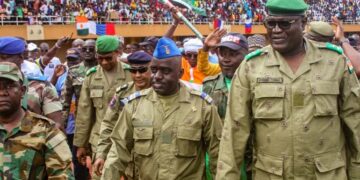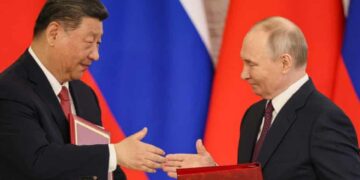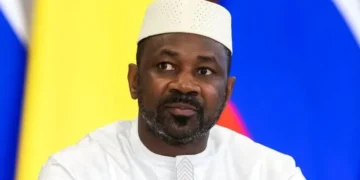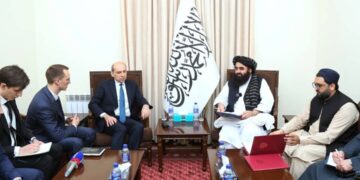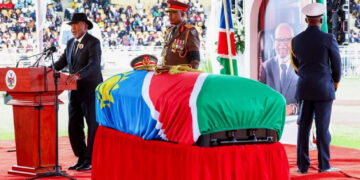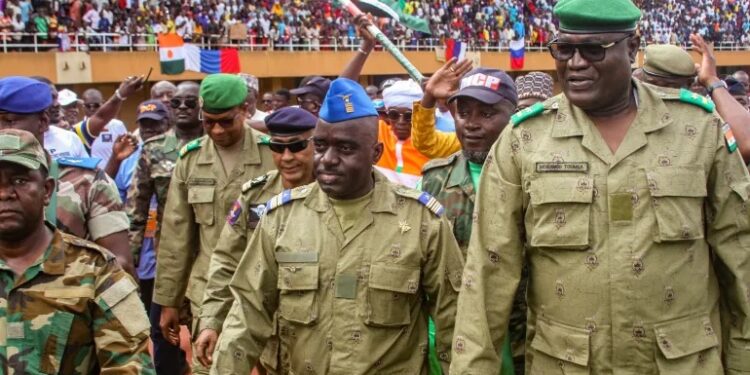By John Ikani
Niger’s airspace has been closed by the leaders of the recent coup, after they rejected an ultimatum issued by West African states.
The ultimatum demanded the reinstatement of deposed President Mohamed Bazoum, threatening military intervention otherwise.
The announcement of the airspace closure was made late on Sunday, coinciding with a large gathering of coup supporters at a stadium in the capital, Niamey.
The crowd came together to show their support for the generals who now control the country, known as the National Council for the Safeguard of the Homeland (CNSP).
Amadou Abdramane, a spokesman for the CNSP, cited the threat of military intervention from the Economic Community of West African States (ECOWAS) as the reason for the airspace closure.
He mentioned that forces were being deployed in two Central African countries, but didn’t provide further details.
Abdramane stated on national television, “In the face of the threat of intervention, which is becoming clearer through the preparation of neighbouring countries, Niger’s airspace is closed from this day on Sunday … for all aircraft until further notice.”
He further emphasized the readiness of Niger’s armed forces to protect the country’s territory, backed by the unwavering support of its people.
This coup marks the seventh one in West and Central Africa in the past three years, causing significant turmoil in the Sahel region.
The area is already grappling with armed groups associated with al-Qaeda and ISIL (ISIS), and it ranks among the world’s most impoverished regions.
ECOWAS responded to the coup with strong condemnation, imposing severe economic and travel sanctions, and even cutting off Niger’s power supply.
The bloc’s defence chiefs have devised a potential military action plan, including deciding when and where to strike if the detained leader is not released and reinstated by the given deadline.
The situation has escalated tensions among West African countries, with Nigeria, Senegal, and Ivory Coast expressing their willingness to send troops.
However, the Nigerian Senate has questioned the President’s request for deployment approval, urging him to explore non-military options.
Burkina Faso and Mali, both governed by military-backed regimes, view any intervention in Niger as a declaration of war against them.
Algeria, which shares a long border with Niger, has also cautioned against a military solution.
France, Niger’s former colonial ruler and with 1,500 troops in the country, pledged its firm support for whatever course of action ECOWAS decides to take after the deadline expires.
However, the specifics of whether military assistance is included remain unclear.
Russia, in contrast, opposes military intervention in Niger. Nonetheless, the head of the Wagner mercenary group has offered the services of his fighters to the country.
It’s reported that Niger’s coup leaders have sought assistance from Wagner, which has become influential in Mali since the 2021 coup and has a longer-standing presence in the Central African Republic and Libya.
In Niamey, large crowds gathered at a 30,000-seat stadium, displaying portraits of the military leaders while expressing disapproval towards France, the former colonial power. Russian flags adorned the venue.
During a speech at the stadium, General Mohamed Toumba, one of the CNSP leaders, denounced those “plotting subversion against the progress of Niger,” warning that they are aware of their malicious intentions.
Coup supporters in Niger are resolute in their stance, with one pensioner, Amadou Adamou, stating that the people have understood the imperialists’ motives and that they will be the ones to suffer the consequences.
In Niamey’s Boukoki neighbourhood, residents expressed their determination to defend their country, with Adama Oumarou stating, “We’re going to fight for this revolution. We’re not going to retreat faced with the enemy; we’re determined.”
He added that they had been anticipating this coup for quite some time.
